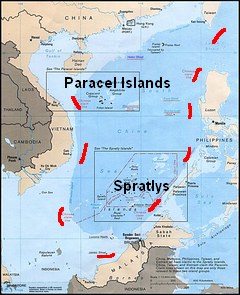China defies the Permanent Court of Arbitration, in The Hague 
The international tribunal delivers a blow to China’s claims in the South China Sea
Manila, Jul 16.─ By ejecting its neighbours’ forces, building up its navy and constructing artificial islands, China has for years sought to assert vast and ambiguous territorial claims in the South China Sea. These alarm its neighbours and have led to military confrontations. They also challenge America’s influence in Asia. Now the Permanent Court of Arbitration, an international tribunal in The Hague, has declared China’s “historic claims” in the South China Sea invalid. It was an unexpectedly wide-ranging and clear-cut ruling, and it has enraged China. The judgment could change the politics of the South China Sea and, in the long run, force China to choose what sort of country it wants to be—one that supports rules-based global regimes, or one that challenges them in pursuit of great-power status.
The case was brought by the Philippines in 2013, after China grabbed control of a reef, called Scarborough Shoal, about 220 miles (350km) north-west of Manila. The case had wider significance, though, because of the South China Sea itself. About a third of world trade passes through its sea lanes, including most of China’s oil imports. It contains large reserves of oil and gas. But it matters above all because it is a place of multiple overlapping maritime claims and a growing military presence (Chinese troops are pictured above on one of the sea’s islands).
America had two aircraft carriers in the sea lately; on the eve of the court’s ruling, China’s navy was staging a live-fire exercise there. Above all it is a region where two world-views collide. These are an American idea of rules-based international order and a Chinese one based on what it regards as “historic rights” that trump any global law.
China claims it has such rights in the South China Sea, and that they long predate the current international system. Chinese seafarers, the government says, discovered and named islands in the region centuries ago. It says the country also has ancestral fishing rights. In early July, by happy coincidence, a state television company began a mini-series about the experience of Chinese fishermen in the 1940s, reinforcing China’s view. These rights are said to exist within a “nine-dash line” (still usually called that, though Chinese maps began showing ten dashes in 2013 to bring Taiwan more clearly into the fold). It is a tongue-shaped claim that slurps more than 1,500km down from the southern coast of China and laps up almost all the South China Sea (see map).
The court comprehensively rejected China’s view of things, ruling that only claims consistent with the UN Convention on the Law of the Sea (UNCLOS) were valid. Under UNCLOS, which came into force in 1982 and which China ratified in 1996, maritime rights derive from land, not history ...
[ Full text ]
Comments powered by CComment